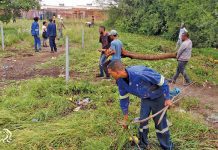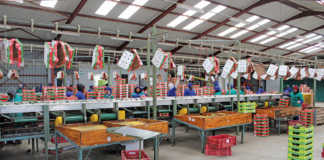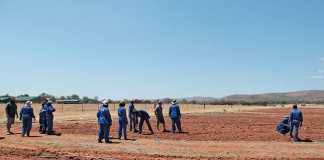By the time farmers who depend on these funds receive the money, it’s often too late in the season to be useful, making mentorship that much more important.Denene Erasmus reports.
Doing the right thing at the right time ensures a good yield. But accessing state funds through the Comprehensive Agricultural Support Programme (CASP) takes so long that money is often only available after the season has passed. By then, it’s too late to help small-scale farmers who depend on it.
This is according to Dirk van Papendorp, a livestock and crop farmer from Swellendam, who earlier this year decided to mentor emerging farmer Dirkie Willemse, who was struggling to turn a profit on his small farm. Dirkie, from nearby Suurbraak, says he tried for three years in a row to access support from the state, but with little luck. “The agriculture department sent people to take soil samples on the farm, but that’s how far it went,” he says.
Eddie Adams, who farms with crops on 257ha next to Dirkie’s 38ha plot, introduced Dirk to Dirkie. Eddie, the Western Cape’s candidate for Agricultural Writers SA’s Emerging Farmer of the Year in 2008, has enjoyed Dirk’s support for many years.“Whenever I visited Eddie I always noticed the piece of land next to his, and time and time again I saw a man on a small, old tractor struggling to turn this piece of land into something,” Dirk recalls. “After meeting Dirkie I wanted to help him as his mentor.”
Dirk says he realised many years ago that successful white commercial farmers couldn’t afford to walk around blind to the needs of new and small-scale farmers. “I believe that through the support of the commercial farming sector and organised agriculture, land reform can work and make a meaningful difference to people’s lives,” Dirk says.
“If agricultural transformation is successful, the whole sector will benefit, but if it fails, everyone will suffer in the end – and that’s why commercial farmers should get involved.“We don’t have to get involved in the politics, we just have to do what we know, and that is to help emerging farmers.” Adds Dirkie, “He told me he would take my hand and help me, but I also had to take his and work with him.”
Choosing a viable crop
Currently, Dirkie has about 13ha of arable land on the plot he farms on communal land belonging to the Suurbraak community. “On such a small piece of land you have to plant something that makes sense, like a high-value crop that can produce a significant return,” explains Dirk.
Dirkie wanted to farm grain, but Dirk suggested that coriander would be more profitable. As Dirk farms with it, he could also help Dirkie secure a market. “Through Dirk, I can market my coriander together with a group of nine commercial farmers, contracted to grow it for a national spice company,” says Dirkie. He can expect a yield of 800kg/ha and a contract price of R8/kg.
Navigating the system
“We needed to establish the crop in June. Before that there was a lot of work to prepare the soil, but we struggled to navigate the state’s support system. If I wasn’t involved, Dirkie would probably still be waiting for an answer,” explains Dirk.The Western Cape agriculture department eventually contributed R31 000 towards establishing a coriander crop, but by the time the money was made available it would have been too late to plant. So instead, Dirk helped Dirkie access the production inputs before the project was even approved.
“I understand that government has to work in a certain way, but this way is so long-winded and complex that, as a mentor, I sometimes feel more like an administrative officer,” says Dirk. “Farmers have to work with nature; we have to follow seasons and plan ahead, and the seasons don’t wait for funds to become available.”
In the Western Cape, CASP funds are distributed through the Cape Agency for Sustainable Integrated Development in Rural Areas (Casidra). Casidra has a mandate to promote agricultural and economic development within a rural and land reform context by providing agricultural production inputs. A farmer like Dirkie has to submit a budget and business plan to the agency, which then approves and distributes funds accordingly.
But Dirk says working with Casidra had it’s difficulties, says Dirk. “We have to submit three quotes for everything we need to buy and then wait weeks, even months, for the money to be approved. You can’t farm that way.” Also, while local government officials and extension officers are certainly friendly and well-meaning, the process is frustrating and complicated for them as well.
“They know the administrative procedure inside and out, but find it difficult to understand the urgency of matters on farm level. So, they struggle to implement the procedure successfully,” says Dirk.Communication is also a problem. “Most of the local community speaks Afrikaans, but many of the officials and extension officers speak only Xhosa or English,” Dirkie explains.
Fixing the system
The system needs to be streamlined with people with the necessary expertise managing the projects, says Dirk.
The ideal, he suggests, would be to cut Casidra out of the system and rather work through local agribusinesses and rope in farmers and representatives of organised agriculture.
“The emerging farmer can still apply to the state by presenting a business plan, but once the state gives its approval, funds for production inputs should be made available immediately though local agribusinesses and input suppliers,” he explains. “I want to see Dirkie develop into a sustainable and profitable farmer,” says Dirk. “After the first year we will go into a normal crop rotation using canola, wheat, barley, oats and lucerne as major crops.”
“I can’t put into words how I feel about the fact that God put Dirk on my path to help me become a successful farmer,” says Dirkie. “This is what I want to do, and I’m determined to become a commercial farmer, but on my own I could never have achieved what we achieved together.”













